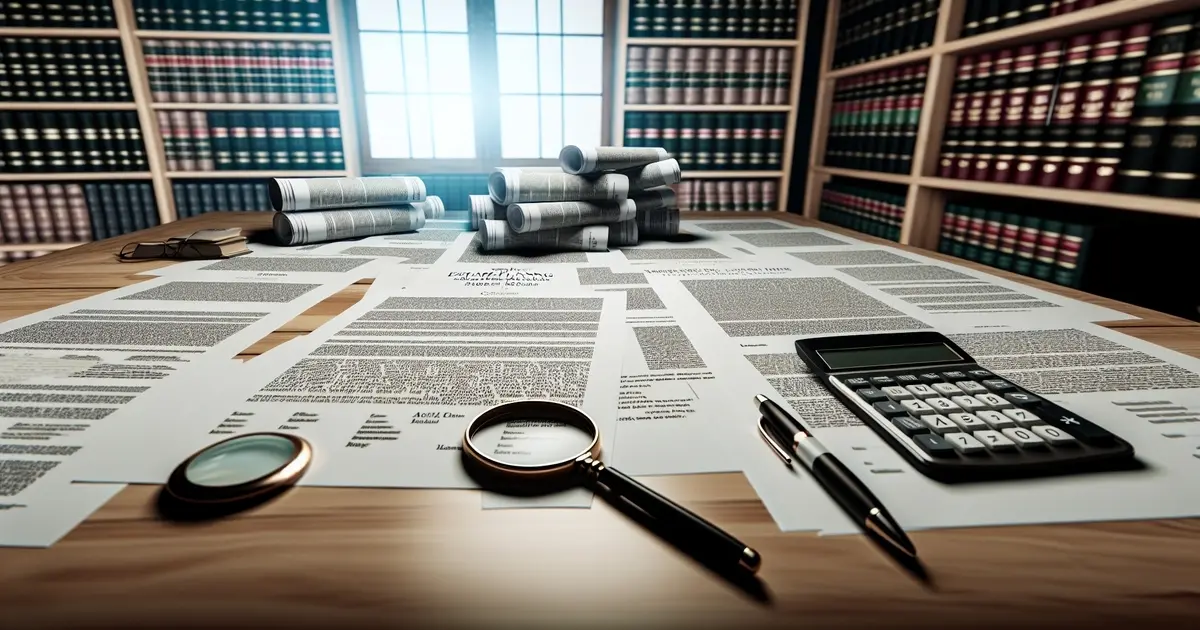Estate Planning Essentials: Avoiding Common Pitfalls
Did you know that over 60% of Americans don't have any form of estate planning in place, leaving their time of death and the distribution of their assets potentially up to court services? It’s a staggering number, considering the peace of mind and security that comes with knowing your assets are well taken care of after you’re gone, through death, with estate planning documents, avoiding court, and utilizing services.
Estate planning isn’t just for the wealthy; it’s a crucial step for anyone looking to safeguard their loved one's future from court and death through services designed to protect assets. Whether you're new to this concept or looking to update an existing plan, stick around for a straightforward guide on navigating the complexities of estate planning, including court services and death.
Table Of Contents
Understanding the Importance of Estate Planning
Family Harmony
Estate planning is a crucial step in ensuring harmony within a family after someone passes away, avoiding court disputes, and managing the assets through death. Without clear estate planning documents, disputes over who gets what can quickly arise after a death. These disagreements about death or estate planning documents can turn ugly, straining relationships among loved ones.
A well-crafted estate plan lays out specific instructions on asset distribution after death. This clarity, especially in estate planning documents, helps prevent potential conflicts by making everyone's entitlements clear upon death. For instance, if you own a house and two cars, your estate plan can specify who gets each asset. This way, there's no room for argument because your wishes are documented.
Financial Security
Ensuring financial security for dependents is another crucial aspect of estate planning. It’s about ensuring that those who rely on you financially are cared for when you're no longer around.
An estate plan allows you to designate beneficiaries for your assets. This means you decide who benefits from what you've worked hard to earn. For example, setting up trusts for your children can provide them with financial support according to the terms you set up.
Asset Management
Sometimes, life takes unexpected turns, such as an accident or illness that leaves someone unable to manage their affairs. Here’s where estate planning comes into play again.
By including powers of attorney in your estate plans, you appoint trusted individuals to decide on your behalf if needed. Whether managing bank accounts or making medical decisions, these designees step in to ensure everything runs smoothly.
This proactive measure controls things during difficult times and ensures that someone can handle essential matters according to your preferences.
Critical Components of the Estate Planning Process
Asset Inventory
Creating an inventory is a critical first step in estate planning. This list includes everything you own and owe, from properties and investments to debts and liabilities. It's about knowing what you have and understanding its value.
Start by listing all your assets. These could be your home, bank accounts, stocks, or valuable collections. Then, move on to liabilities like loans or mortgages. This comprehensive approach ensures everything is noticed in the planning process. Remember, this inventory should be as detailed as possible for accuracy.
Next comes updating this inventory regularly. Life changes, such as buying a new house or paying off debt, affect your estate plan. Regular reviews help keep everything current.
Choosing Beneficiaries
Selecting beneficiaries is another crucial part of estate planning. It involves deciding who gets what after you're gone. This step requires careful thought to ensure your wishes are carried out correctly.
Firstly, list potential beneficiaries, including family members, friends, or charities that matter to you most. Then, decide which assets each will receive. Be clear in your instructions to avoid confusion during the probate process.
For parents with minors, choosing guardians is equally crucial if something happens to both parents unexpectedly. Think about who shares your values and would provide a loving home for your children.
Plan Updates
Estate planning is an ongoing process that needs regular updates to reflect changes like marriage, divorce, the birth of children or grandchildren, or even significant financial shifts.
One key reason for updates is to ensure the plan remains effective over time. Changes in state laws can also impact how plans are executed after death, making it vital to stay informed and adjust accordingly.
The checklist approach helps here: Review each part of your estate plan at least every few years or after significant life events, checking off items as they remain valid or need adjustment.

Essential Legal Documents for Estate Planning
After discussing the key components of estate planning, it's crucial to delve into the legal documents that comprise a comprehensive plan. These documents are pivotal in ensuring your wishes are honored, and your loved ones are cared for after you're gone. Let's explore these vital instruments.
Will Creation
A will is the cornerstone of any estate plan. It outlines how you want your assets distributed after death. Without a will, state laws decide who gets what. This might not align with your wishes.
Creating a will lets you specify guardians for minor children or pets, ensuring they're safe. For example, if you have young kids or beloved animals, mentioning them in your will provides peace of mind about their future care.
Power of Attorney
Appointing a power of attorney (POA) is another critical step in estate planning. This document grants someone else the authority to decide if you become incapacitated.
The person chosen can manage financial affairs or make healthcare decisions, depending on the type of POA granted. Selecting someone trustworthy and capable of making tough choices under pressure is essential.
Healthcare Directive
Also known as a living will, this directive outlines your medical care preferences if you cannot communicate them yourself. It ensures that doctors and family members know whether you want life-sustaining treatment under certain conditions.
Having a healthcare directive spares loved ones from making agonizing decisions during stressful times. They won't have to guess what you would have wanted because it's all in writing.
Differences Between Estate Planning and Will Creation
Broader Scope
Estate planning is more than deciding who gets what after you're gone. It's about respecting your wishes, even if you can't speak for yourself. This includes healthcare decisions and who will make them on your behalf.
A comprehensive estate plan covers scenarios beyond asset distribution. For example, it might detail your preferences for medical treatment if you become incapacitated. This ensures that someone you trust has the power of attorney to act in your best interest.
Single Component
A will is crucial, but it's just one piece of the puzzle in estate planning. Think of a will as a tool within a more extensive toolkit. It specifies guardians for minor children and how to distribute personal belongings.
However, relying solely on a will can leave gaps in your plan. Assets not listed or acquired after writing the will might not be covered. That's why an estate plan goes further by setting up trusts and other mechanisms to handle such situations.
Tax Minimization
One key advantage of thorough estate planning is reducing taxes and legal hurdles for your heirs. Strategies include setting up trusts or gifting parts of your estate while still alive.
These steps can significantly lower the tax burden on your beneficiaries. Without proper planning, much of your estate could go to taxes instead of loved ones or charities you wish to support.
- Example:
- Trusts can bypass probate.
- Gifts reduce the size of the taxable estate.
Common Mistakes in Estate Planning to Avoid
Life Changes
After major life events, updating your estate plan is crucial. Many people create a plan and then need to remember about it. This oversight can lead to problems.
Your estate plan must be reviewed when you marry, divorce, or have a child. These events change who might inherit your assets. A helpful hint is to set reminders to review the plan yearly.
Not updating can mean the wrong person inherits your wealth, leading to legal battles among family members. Always keep your beneficiaries and will up-to-date.
Digital Assets
Digital assets often need to be noticed in estate planning. Yet, they are an essential part of our lives now. Think about social media accounts or online banking.
Please include these to avoid issues after you're gone. Your family might be unable to access important information or memories stored online.
Ensure you list all digital accounts and passwords somewhere safe but accessible for those managing your estate later. Include instructions on what should happen with these accounts after you pass away.
State Laws
State laws significantly impact estate plans but should be more frequently addressed. Each state has its own rules regarding inheritance and taxes.
Not considering state laws can result in unexpected taxes or legal issues for heirs. For instance, some states impose their estate tax, which could affect how much of your wealth is passed on.
A flat-fee consultation with an attorney knowledgeable about local laws can benefit you here. They can guide you through specific state requirements, ensuring compliance and minimizing surprises for heirs.
Remembering these common mistakes during estate planning ensures smoother transitions when the time comes:
- Reviewing plans after life changes
- Including digital assets
- Considering state-specific laws
Avoiding these errors helps protect both your legacy and loved ones' futures.
Maximizing Benefits Through Trusts in Estate Planning
Controlled Distribution
Trusts are powerful tools in estate planning. They allow for a controlled distribution of assets. This means you can decide when and how your beneficiaries receive their inheritance.
For example, you might set up a trust to distribute funds to a beneficiary when they reach a certain age. Or specify that the money should be used only for education or health care services. This ensures your assets are used as you intended.
Beneficiaries often appreciate this approach. It provides them with financial support while guiding them on responsible asset management. It's an effective way to help younger beneficiaries grow into their inheritances responsibly.
Tax Reduction
Trusts can significantly reduce estate taxes. By placing assets into trusts, the total value of your estate decreases, which may lower the amount subject to federal government taxes.
Here's how it works:
- Assets placed in certain types of trusts are no longer part of your taxable estate.
- This reduces the overall value of your estate.
- Consequently, your estate may owe less in taxes upon your death.
This is especially beneficial for estates that would otherwise face hefty tax bills due to their size or complexity. Reducing these taxes means more of your wealth goes directly to your loved ones or charitable organizations rather than the government.
Creditor Protection
Trusts also offer creditor protection for beneficiaries. Once assets are placed in a trust, they're generally out of creditors' reach. If a beneficiary has debts or legal judgments against them, those creditors cannot quickly seize what you've left them via the trust.
For instance, if a beneficiary is going through bankruptcy or divorce proceedings, assets held in trust typically remain protected. This safeguard ensures that what you leave behind benefits those you intend it to, not their creditors or ex-spouses.
Privacy Advantages
Avoiding probate is another significant benefit trusts offer within estate planning contexts:
- Probate is public; anyone can access records detailing who inherits what.
- Trusts bypass this process entirely.
By avoiding probate through trusts:
- Your family’s financial matters stay private.
- Beneficiary designations and distributions aren't made public records.
This privacy protects both the details of your estate and the identities of its beneficiaries from prying eyes.
Addressing Tax Implications in Estate Planning
Gift Strategies
One effective way to lessen estate taxes is by utilizing gifts. You can give away assets or money during your lifetime. This helps reduce the overall value of your estate.
Every year, you can give a certain amount to as many people as you like without it counting against your lifetime exemption. This means less of your estate could be subject to high taxes after you pass away. For example, if you start gifting early, you can significantly decrease the size of your taxable estate.
It's wise to consult with a tax advisor before making significant gifts. They can help ensure these gifts fit your broader financial and estate planning strategy.
Understanding Taxes
Knowing the difference between state inheritance tax and federal estate tax is crucial. Not all states have an inheritance tax, but for those that do, it’s charged on what beneficiaries receive from an estate.
The federal government imposes an estate tax based on the entire value of the deceased person's assets minus debts and other deductions. Exemptions and thresholds mean many estates won't owe federal taxes at all.
It's important to understand these differences so you can plan accordingly. Some strategies involve setting up trusts or relocating assets to take advantage of more favorable state laws.
Life Insurance Policies
Leveraging life insurance policies offers another strategy for managing potential tax liabilities within estate planning. These policies can provide liquidity at the death when funds might be needed most for paying off debts or covering taxes without having to sell off valuable assets at unfavorable times.
Life insurance proceeds are generally income-tax-free to beneficiaries; however, they might still count towards the estate's value for calculating estate taxes unless properly structured within trusts or other financial instruments.

Roles and Responsibilities of a Trustee in Estate Planning
Managing Assets
Trustees have a big job. They must manage trust assets well, which means following the rules of the trust document.
First, trustees need to understand what the trust owns. This could be money, real estate, or stocks. Then, they ensure these assets are safe and growing, if possible. For example, they might decide to sell one investment and buy another. But every decision must match the trust's goals.
Distributing Assets
Next up is giving out the assets. Trustees need to hand over money or property whenever they want. They follow the plan laid out in the trust document.
This often involves making regular payments to beneficiaries. Sometimes, it's for specific things like education costs or medical bills. Other times, it might be an age-based distribution, like when a beneficiary turns 21. The trustee must get this right because it directly affects people's lives.
Keeping Records
Record-keeping is crucial for trustees, too. They need to know what they've done and have clear records.
They track every asset entering or leaving the trust and prepare financial reports for beneficiaries, showing the trust's performance. These reports are often required annually but might be more frequently depending on the situation.
Trustees also keep detailed notes on decisions made about investments or distributions. This way, there's always a clear trail of their actions and reasons behind them.
Necessity of Legal Assistance in Estate Plan Creation
Law Compliance
Hiring an attorney for estate planning ensures you follow current laws. Laws change often, and an expert knows these updates.
They can guide you through legal procedures. This minimizes risks of errors that could lead to probate court. Probate is lengthy and costly.
Expert Guidance
An attorney offers advice on complex issues. For example, trusts and tax planning are complicated and require specialized knowledge.
They help structure your estate to reduce taxes and advise creating legal trust protection for benefits.
Avoiding Pitfalls
Common mistakes in estate planning can result in disputes or litigation after death. An attorney helps avoid these pitfalls.
For instance, unclear wording in a will can cause family conflicts. Legal assistance ensures clarity and fairness in your documents.
Closing Thoughts
Estate planning might seem daunting, but you've already taken the first step by acquiring knowledge. You can tackle this head-on by understanding the why and what, navigating legal documents, sidestepping common pitfalls, and leveraging trusts for your benefit. Remember, it's not just about protecting your assets; it's about peace of mind and security for those you love. And hey, nobody said you have to go it alone—getting professional help can be a game-changer.
So, what's the next move? Keep this tab closed in your browser of life. Make that call, set up that meeting, and start sketching your plan. Your future self (and family) will thank you. Let's not just plan for the days ahead but thrive in them. Ready to take control? Your estate planning adventure begins now.
Frequently Asked Questions
What is estate planning, and why is it important?
Estate planning is like creating a roadmap for your assets after you're gone. It ensures your wishes are followed, minimizes taxes, and efficiently provides for your loved ones.
What key components, such as probate court considerations, managing financial affairs, consulting a tax advisor, and updating beneficiary designations, should be included in the estate planning?
Think of it as packing for a trip. You'll need a will, trusts (maybe), powers of attorney, and healthcare directives to ensure everything's covered.
How does estate planning, which includes probate court avoidance, consulting a tax advisor, managing financial affairs, and updating beneficiary designations, differ from just having a will?
Having only a will is like using an old map; it gets part of the job done. Estate planning is the GPS—it precisely guides every aspect of asset distribution.
Can you list some common mistakes to avoid in estate planning, such as not consulting a tax advisor, failing to make a copy of directives, and not planning for death?
Sure! Skipping updates after life changes, not considering all assets, overlooking potential tax implications, and trying to DIY without professional advice are pitfalls you'd want to dodge.
Why might someone use trusts in their estate plan?
Trusts are secret weapons in estate planning. They help control how your wealth is distributed, can protect assets from taxes, and keep things private—like a financial invisibility cloak!
How do taxes affect my estate plan?
Taxes can significantly reduce your estate if not appropriately planned. Think of them as navigation hazards that require careful maneuvering to avoid reducing what your heirs receive.
What role does a trustee play in an estate plan, acting as a tax advisor, managing court matters, and ensuring a copy of the will is available upon death?
A trustee acts like the captain of your ship after you leave. They manage and distribute your trust's contents according to your compass—your detailed instructions.
Related Post
Divorce Proceedings
Divorce proceedings, including separation and visitation issues, can feel like a labyrinth, with each turn presenting new challenges, such as seeking legal advice and decisions about arbitration, that impact your future.
Read MoreCriminal Proceedings
Diving into criminal proceedings can feel like stepping into a labyrinth, where each turn presents new challenges, unexpected twists, and steps that witnesses and future hands must navigate.
Read MoreLegal Processes
Have you ever wondered why legal processes feel like a labyrinth? You're not alone. The world of law is intricate, filled with procedures and jargon like 'preliminary hearing,' 'separate proceeding,' 'criminal cases,' and 'juro and 'jurors' that can seem like a foreign language to the uninitiated.
Read MoreCivil Litigation Explained
Have you ever wondered what keeps the wheels of justice turning in civil court disputes that don't involve criminal charges, like a civil lawsuit or a jury trial, with the aid of a court reporter?
Read MoreEstate Planning Lawyer vs Trusts and Estates Lawyer
Have you ever wondered why navigating the maze of estate planning, with its court laws, executor duties, and invaluable guidance, feels so daunting?
Read MoreEstate Planning Lawyers
Did you know that over half of Americans need the essential documents for estate planning in elder and family law, which are crucial for clients?
Read More






